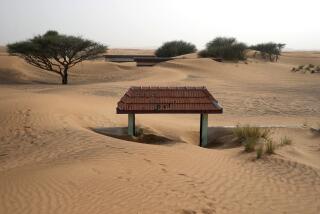Foreigners Dominate in Arab Emirates
- Share via
DUBAI, United Arab Emirates — In the United Arab Emirates, foreigners talk wistfully of the good old days, when oil made the desert state a fortune seeker’s El Dorado.
Plunging oil prices ended the boom that made the Emirates’ Arabs among the world’s richest but left them outnumbered 3 to 1 by foreigners, whose ranks had swelled to a million in less than 15 years.
Most immigrants confounded predictions that they would vanish as quickly as they came. Though rarely granted citizenship, they have soldiered on through the lean times here or have been replaced by eager newcomers.
Permanent Fact of Life
Indeed, the Emirates’ relaxed immigration laws last year to allow more foreign workers to bring their families, a move that diplomats said showed growing acceptance of the immigrant as a permanent fact of life, not just a temporary guest.
“Foreigners are now an integral part of society, servicing the economy they helped to build, and generating wealth of their own,” a Western diplomat said.
“It’s difficult to see how that situation could easily be changed, even if anyone wanted to.”
But from India, the pattern of immigration has altered much since the 1970s and early 1980s, said Jidnder Mahagan, the Indian consul-general based in Dubai.
“It used to be unskilled laborers, but increasingly semi-skilled workers and professionals come here,” he said.
50,000 Filipinos Alone
More than 500,000 people from the Indian subcontinent live in the United Arab Emirates, alongside thousands of foreign Arabs, many of them Palestinians, and nearly 50,000 Filipinos.
So great is the lure of high wages that many would-be immigrants from India, Pakistan and Iran dodge coastal patrols to scramble ashore illegally from fishing boats.
Yet wage levels have fallen and the annual gross national product per capita slumped from more than $30,000 in 1983 to $15,000 last year.
But the opportunities are still enormous when seen through the eyes of a laborer from countries far, far poorer than this one.
“I earn five times more here as a waiter than I did working in a factory in India, and I send most of it back home,” said Ali, who arrived three years ago.
Oil-Fed Growth
The country’s native Arabs, descended mainly from desert Bedouins, are pleased with the oil-fed growth of their glittering modern cities from the desert sands.
And most Arabs have accepted the foreigners with good grace, despite being reduced to a minority in their own country.
“It’s remarkable how little friction there is,” a Western diplomat said. “Proportionately, it’s as though 150 million immigrants arrived in Britain and hardly anyone cared.”
But the assimilation has not been entirely free of strain.
Some Local Resentment
Local newspapers occasionally call for more jobs to be reserved for nationals. And educated foreigners say they sometimes face local resentment.
Diplomats do not think the government will let immigration rise further, but they say it could make purely economic sense using the asset of foreign labor to build the manufacturing base that the United Arab Emirates needs to cut its dependence on oil.
In Dubai’s Jebel Ali free zone--where employers may import workers unrestricted and which businessmen rate a success--thousands of people from the subcontinent make clothes and light industrial goods or supply services.
Bustling Dubai has been the region’s thriving center of trade for centuries, and foreigners from Iran and other countries have lived there for generations.
More to Read
Sign up for Essential California
The most important California stories and recommendations in your inbox every morning.
You may occasionally receive promotional content from the Los Angeles Times.













